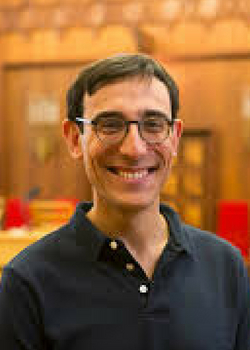The synagogue Torah service is typically an auditory experience. We sit in our seats and listen to the words being conveyed to us by our Ba’al/Ba’alat Koreh. There are however, certain moments in the annual Torah cycle that are best observed visually, and standing at the bima is really the prime real estate to experience them from.
On Parashat Yitro, for example, we not only hear about the giving of the Torah at Sinai but we reenact that event by rising from our seats and standing at attention just as our ancestors did in the wilderness at Sinai. On other Shabbatot, one can see the little graphic clues within our Torah scrolls that are missed from the comfort of a pew. The wide breaks between the Five Books of the Torah. All that white space on a precious, hand treated, piece of parchment. On yet other weeks, one might catch lines of Biblical poetry indicated in the layout of the scroll. But this week, Parashat Ha’azinu, every verse is special. The entire Torah portion is dominated by that poetic layout. The shift tells us that this week’s words will be even richer, even more layered in meaning, than is typical for an already multifaceted tome.
One verse amidst that poetic sea caught my eye:
6 Do you thus reward the LORD, O Dull and witless people?
Is not He the father who acquired you, Fashioned you and made you endure?
What does the Torah mean when it describes us as acquired/kanahby God? What kind of relationship might we have with a deity who "owns" us?
Interestingly, each of the three major Medieval Torah commentators presents a radically different answer to this question.
For Rashbam, the term is understood literally. God acquired the Jewish people by redeeming us from the power who previously controlled our destiny, the Egyptian Pharaoh who enslaved our ancestors. Ibn Ezra, the great 12th Century Spanish rabbi and grammarian, instead turns to the Book of Psalms, and finds an example where acquired/kanah implies creation. Understood through that lens, the Blessed Holy One is saying that God has power over us – not as a purchaser of one People at one specific moment in history – but as the One who created us along with all the other diverse creatures on the face of the earth. Rashi is more fanciful still. He claims that the word kanah in this verse hints at a God who gently places us in our nests (kanancha) and prepares our needs for us (takankha). That God is a different deity altogether, one almost maternal, or perhaps, better yet, grand-maternal in character. Rashi’s God has earned our loyalty and love by tending to our every want and need throughout time.
Over the last few weeks we have certainly experienced Rashbam’s and Ibn Ezra’s visions of the divine. On Rosh Hashanah, we spoke to the God of Creation and began to ask that image of the divine for forgiveness. On Yom Kippur, we beseeched an all-powerful King – much like Rashbam’s redeemer from the slave masters in Egypt – for mercy in the coming year. Now, as we head toward the holiday of Sukkot, out of our own homes and into God’s tent, the Sukkah, Rashi suggests a third vision of the divine for us to encounter there. A God who wishes to nurture and care for us like a mother bird tends to her chicks, or a grandmother, her beloved eyniklekh.
Having stood before those more severe, and perhaps even off-putting, visions of the divine in the weeks that have passed, may we take a fresh look at the visual images of Ha’azinu, and the imagery of God that our commentators have fleshed out for us there as well. May we come to know a loving and merciful God to celebrate on Sukkot, one who adores us like a beloved grandchild, and continue to hold that God close at the end of this festival season and into Simchat Torah, when we shall once again celebrate our completion of a year’s Torah readings, and begin the cycle once again.
Shabbat shalom.

